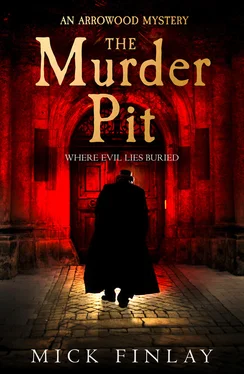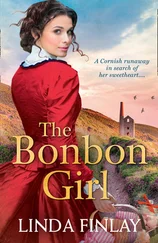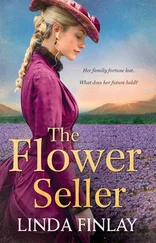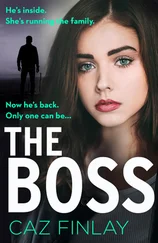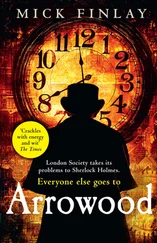‘Digger don’t talk,’ said the Mongol, coming over to us. ‘I’m Willoughby, sir.’
‘I’m most pleased to meet you, Willoughby,’ said the guvnor. ‘And you, Digger. Is Mrs Gillie here?’
‘Back soon, I reckon.’ Willoughby’s thick tongue curled out between the black stumps that were his teeth. Then, for no reason that I could see, he added, ‘I’m happy.’
‘That’s good to hear, my friend. And you both work at Ockwell’s farm, do you?’
‘Best workers, we are. Got three horses. Count Lavender, he’s the big white shire. You got a horse, sir?’
‘I’m afraid not.’
‘Mrs Gillie’s my friend, she is. She leave soup?’ he asked, patting his belly. ‘Got pinchy in here.’
‘No, Willoughby. The fire’s out.’
Digger made an angry noise with his throat.
‘No soup?’ said Willoughby, stooping to check the pot.
‘I don’t think so, son,’ said the guvnor.
Willoughby looked quick over his shoulder, across the stream to the field they’d come from. ‘Got to hurry. Get back to work.’
‘D’you know Mrs Birdie, Willoughby?’
‘She’s my friend, she is. I like Mrs Birdie.’
‘We like her too, Willoughby. How is she, d’you think?’
‘Happy, sir.’
‘I see.’ The guvnor reached into my coat pocket, pulled out the block of toffee, and broke off two pieces. He gave them to the men.
‘Thank you, sir!’ said Willoughby. His eyes shone in delight, his mouth wide like he was laughing. But instead of eating it, both men put the toffee in their pockets.
‘D’you think Mrs Birdie’s in any trouble?’ asked the guvnor in his gentle voice.
‘She’s happy. Pretty lady. And Dad is.’
‘D’you know why she won’t see her parents? They’re worried.’
Willoughby shook his head. ‘Won’t see her parents, no.’
‘But why? D’you know why she won’t?’
‘Not allowed in the house. Me and Digger. Miss Rosanna say.’
‘You’re not allowed in the house?’
‘Not allowed. Get mud all over, see. Mud and stink. You ain’t got a horse, sir?’
‘No, Willoughby.’
‘We got three horses. I look after them, I do. You my friend, Mr Arrowood?’
‘Yes, my dear. Listen, can you bring Mrs Birdie to meet us? It’s very important we talk to her. We’d give you a shilling if you’d do it.’
Willoughby shook his head. ‘Not allowed. She only come out for washing.’
‘Then how do you know she’s happy?’
‘She’s happy, sir,’ answered Willoughby. This time he was a little quieter, a little less smiley. He looked at me. ‘You my friend, Mr Barnett?’
‘’Course I am, mate,’ I said.
‘D’you know her, Digger?’ asked the guvnor.
Digger looked up, the anger returning to his sharp face.
‘He don’t speak,’ said Willoughby.
‘Does he understand?’
‘Understands. Don’t speak is all, sir.’
‘Well, it’s good to meet you both. So very good.’ The guvnor grasped Willoughby’s arm and squeezed it. When he made for Digger’s, the bloke stepped away.
‘Tell me, Willoughby, what do you do on the farm? What work?’
‘Yeah, work. We do.’
‘But what work? What d’you do?’
‘Do horses, feed the pigs, clear the dung. Berkshires, they are, sir. Few Large Whites. Sowing, but that’s not much. Turnip, potato. Do the, spread the dung too. Helps them grow, sir.’ Here he had to catch his breath. He couldn’t seem to talk for long before starting to pant. ‘Best workers. That’s Digger and me. And Tracey Childs. He’s gone now. Three best workers. Three brothers. Look after each other.’
‘D’you like working for the Ockwells?’ asked the guvnor.
‘Happy,’ said Willoughby. ‘Going back to my brother’s soon. Go live there. Dad do it.’
‘Your father? That’s good.’
‘No. Dad, he do it.’
‘Not your father?’
‘Mr Godwin, he’s my dad. We’re family now.’
‘Mr Godwin’s your father?’ asked the guvnor, his head tilted in confusion.
‘He died, father did. Mr Godwin’s my dad now. Dad, I call him.’
‘Ah, I see. You mean you just call him Dad.’
‘Call him.’
‘Did you grow up here in the village, Willoughby?’
‘Kennington, with John. And father. And ma.’
‘And what about Digger? Where’s he from?’
‘He don’t talk.’
‘D’you like working here, Digger?’ asked the guvnor. ‘You can nod or shake your head.’
Digger held the guvnor’s eye for a moment. His breath caught, like he was nervy. He looked away.
‘We’re best workers,’ said Willoughby, his smile broad again. ‘Dad say it. Best he’s had. We’re family now. And Mr Walter, and Miss Rosanna. They love us. Like family. D’you know my brother, Mr Arrowood? John. D’you know him?’
‘I’m afraid I’ve never met your brother.’
‘I go live with him. Dad say. Dad knows John.’
The fellow nodded. His tongue came out of his mouth and passed over his cracked lips.
‘Willoughby, I want you to think hard now. Is there any reason Birdie’s not happy? Any reason at all?’
‘Happy,’ he said, but he didn’t sound sure.
‘Do they hurt her?’
‘Hurt her.’
‘They do?’
Willoughby fell silent. He looked up at the crows, his mouth opening and closing.
‘I’m happy,’ he said at last.
The guvnor looked at me and frowned. ‘Tell me, do they have any children up there?’
Willoughby shook his head and glanced over at the field again.
‘Got to go, sir. Get back to work.’
Digger had already turned and was crossing the stream. Willoughby followed.
‘D’you know where Mrs Gillie is, Willoughby?’
‘Seen her last night. Over larch field.’
‘Well, bye bye, lads,’ said the guvnor. ‘We’ll call on you again.’
‘I hope so,’ said Willoughby. ‘I’ll dream of that.’
‘What a pleasant boy,’ said the guvnor as they disappeared through the trees.
‘Reckon he’s a man, sir,’ I replied. ‘Twenty-five year at least.’
‘Well, I like him.’ He sighed, patted his belly, and looked around the camp. It was only then I spotted the crows, three of them, standing by a bush on the other side of the stream. They were pecking away at something hidden in the leaves. A bad feeling came over me. As I approached, the birds hopped away, watching me with their dead, black eyes. One had a string of flesh hanging out of its mouth. It was only when I stepped over the fallen tree I saw what they’d been picking at: it was Mrs Gillie’s cat, its innards pulled and scraped from its shell.
‘Look, William,’ I said, pointing.
Its skull was beaten to a pulp.
The same young fellow was behind the desk of the police station when we arrived. He went into the back room to fetch Sergeant Root, who listened to the guvnor’s story with a frown, his dirty fingers tap-tapping on the desk.
‘She’s joined another camp,’ he said when the guvnor finished, his eyelids drooping like he was bored. ‘They don’t stay in one place long.’
‘She’s left her horse, her coat, her boots,’ answered the guvnor. ‘Her caravan door was wide open, Sergeant.’
‘They’re easy like that. I appreciate you letting us know, sir.’
Root turned back to the room.
‘Sergeant!’ said the guvnor sharply. ‘You must at least go down and have a look. She’s an old woman, for pity’s sake!’
‘Tinkers disappear, that’s what they do. And usually after they’ve emptied a house of its silverware. You know they’ve been thieving from the building sites, I suppose?’
‘There’s been trouble, I tell you,’ said the guvnor. ‘The flowers she sells are scattered on the ground. And how d’you explain the cat? No animal could have done that.’
Читать дальше
